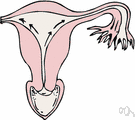nephron
(redirected from Nephrons)Also found in: Thesaurus, Medical, Encyclopedia.
nephron
A. renal vein
B. renal artery
C. blood vessels
D. blood
E. Bowman's capsule
F. glomerulus
G. collecting duct
H. urine
I. loop of Henle
neph·ron
(nĕf′rŏn)n.
The functional excretory unit of the vertebrate kidney that regulates the amount of water in the body and filters wastes from the blood to produce urine.
[German, from Greek nephros, kidney.]
American Heritage® Dictionary of the English Language, Fifth Edition. Copyright © 2016 by Houghton Mifflin Harcourt Publishing Company. Published by Houghton Mifflin Harcourt Publishing Company. All rights reserved.
nephron
(ˈnɛfrɒn)n
(Anatomy) any of the minute urine-secreting tubules that form the functional unit of the kidneys
Collins English Dictionary – Complete and Unabridged, 12th Edition 2014 © HarperCollins Publishers 1991, 1994, 1998, 2000, 2003, 2006, 2007, 2009, 2011, 2014
neph•ron
(ˈnɛf rɒn)n.
the filtering and excretory unit of the kidney, consisting of the glomerulus and convoluted tubule.
[< German Nephron]
Random House Kernerman Webster's College Dictionary, © 2010 K Dictionaries Ltd. Copyright 2005, 1997, 1991 by Random House, Inc. All rights reserved.
neph·ron
(nĕf′rŏn) One of the units of the kidney that filter waste products from the blood and produce urine.
The American Heritage® Student Science Dictionary, Second Edition. Copyright © 2014 by Houghton Mifflin Harcourt Publishing Company. Published by Houghton Mifflin Harcourt Publishing Company. All rights reserved.
nephron
The basic filtration unit in a kidney. See glomerulus, tubule.
Dictionary of Unfamiliar Words by Diagram Group Copyright © 2008 by Diagram Visual Information Limited
ThesaurusAntonymsRelated WordsSynonymsLegend:
Switch to new thesaurus
| Noun | 1. |  nephron - any of the small tubules that are the excretory units of the vertebrate kidney nephron - any of the small tubules that are the excretory units of the vertebrate kidneytubule - a small tube malpighian body, malpighian corpuscle, renal corpuscle - the capsule that contains Bowman's capsule and a glomerulus at the expanded end of a nephron kidney - either of two bean-shaped excretory organs that filter wastes (especially urea) from the blood and excrete them and water in urine; "urine passes out of the kidney through ureters to the bladder" |
Based on WordNet 3.0, Farlex clipart collection. © 2003-2012 Princeton University, Farlex Inc.
Translations
Nephron
neph·ron
n. nefrona, unidad funcional y anatómica del riñón.
English-Spanish Medical Dictionary © Farlex 2012
